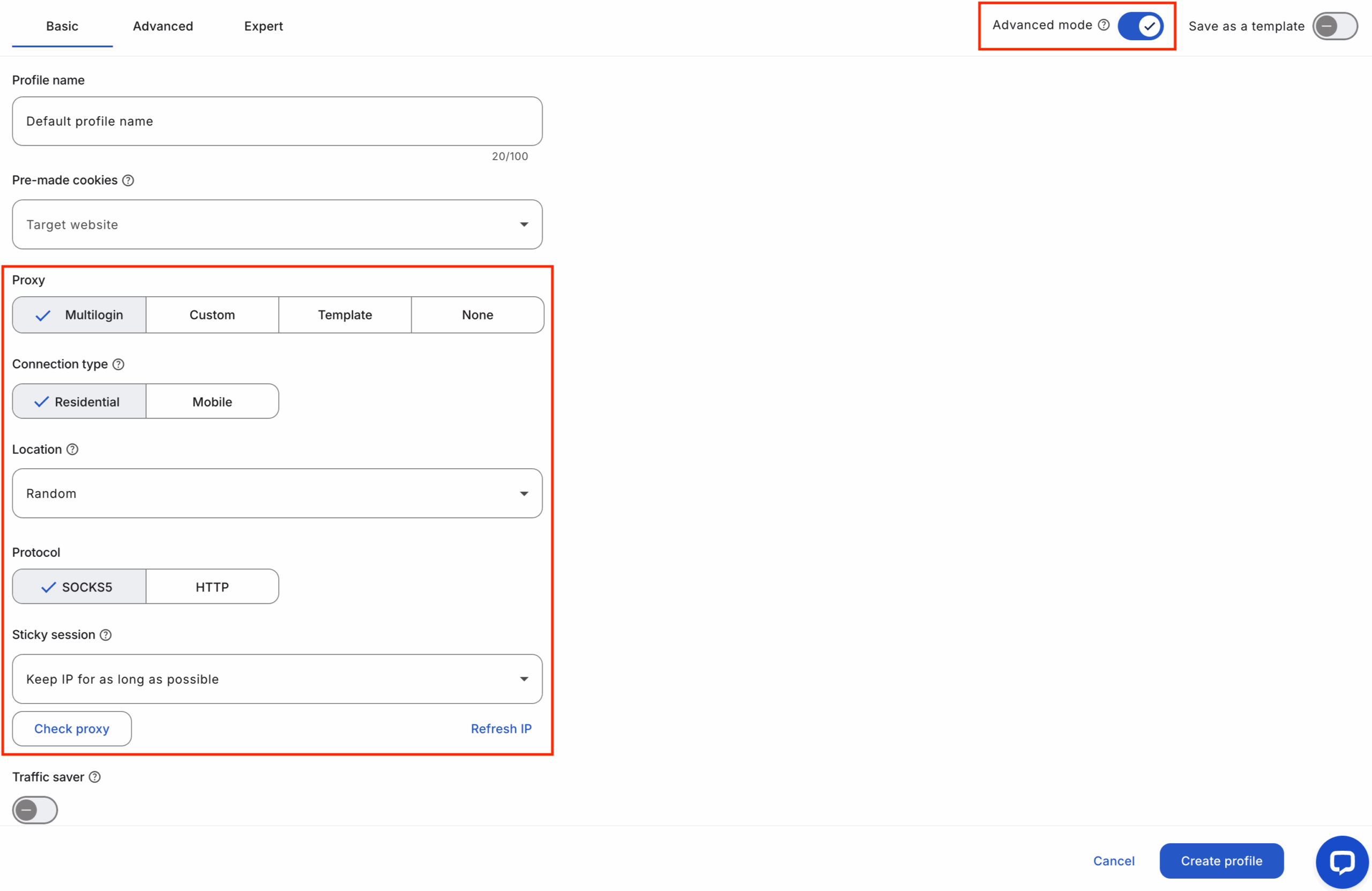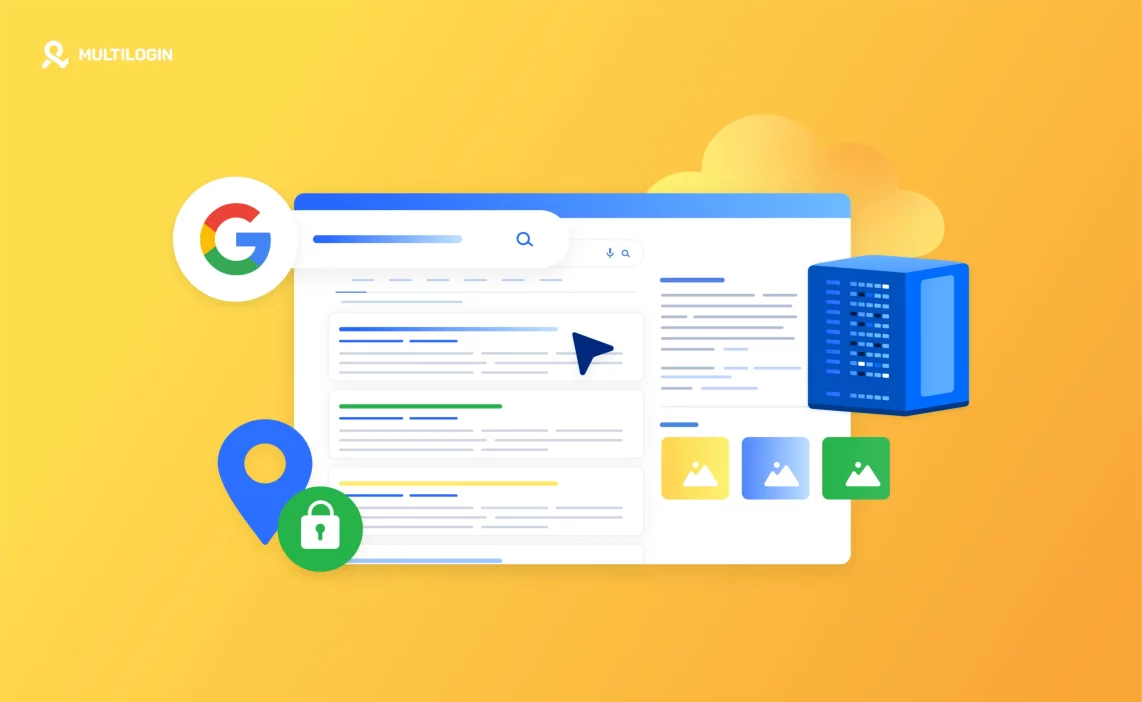You open your laptop, run a few keyword checks, and—bam—you’re staring at a CAPTCHA. One more request, and Google throws a temporary ban your way. If that sounds familiar, you’ve met Google’s defense system against scrapers.
Now imagine accessing all that data—billions of searches every single day—without a single block. That’s what a Google proxy does. It hides your identity, rotates IPs, and lets you collect the SERP data you need without triggering alarms.
For SEO tools, rank trackers, and data-driven marketers, SERP proxies are the quiet engine keeping everything alive. They make it possible to analyze rankings, verify ads, and study competitors in real time—while staying invisible.
In this guide, you’ll see how Google proxies work, why they matter, and how combining them with an antidetect browser like Multilogin keeps your scraping clean, consistent, and undetected.
Read more about how to manage unlimited Google accounts!
What is a Google SERP proxy?
Before diving into proxies, let’s clear up the basics. SERP stands for Search Engine Results Page — the screen you see every time you search on Google. But a SERP isn’t just a list of links; it’s a complex mix of elements:
- Organic results
- Paid Google Ads
- Featured snippets
- People Also Ask boxes
- Maps, images, and videos
- Local listings and reviews
For SEO professionals, marketers, and data collectors, each part of that page hides valuable insights — keyword rankings, ad positions, content patterns, and competitive trends. The problem? Google doesn’t like being scraped. If you send too many requests from the same IP, you’ll hit a CAPTCHA, slow responses, or even a temporary block.
That’s where a Google SERP proxy changes everything.
A Google SERP proxy is a specialized Google proxy that stands between your scraper or rank tracker and Google itself. Instead of sending all your queries from one IP address, the proxy rotates multiple IPs — often from real residential or mobile networks — so every request looks like it’s coming from a different person, in a different place.
If you get banned, the proxy switches your IP instantly and keeps the data flowing. Some SERP proxies even let you target specific regions, languages, or devices — so you can see exactly what users in London, Berlin, or New York see when they search.
Think of it like sending dozens of researchers out into the world to collect the same Google results from different spots. No one raises suspicion, and you get clean, accurate data that isn’t filtered, throttled, or blocked.
In short, a Google SERP proxy lets you access the real Google — without the barriers, the CAPTCHAs, or the risk of bans.
Why Use a Google SERP Proxy?
Try scraping Google for a few minutes and you’ll see how fast it fights back. One moment your tool is working fine; the next, you’re staring at a CAPTCHA or watching requests crawl to a stop. Google flags anything that looks automated — and it doesn’t take much to trigger that.
A Google SERP proxy fixes that problem. It hides your real IP, rotates through thousands of clean addresses, and makes every request look like it’s coming from a different person in a different city. If one IP gets banned, another takes its place before you even notice. That’s the difference between losing hours of data and collecting results nonstop.
Here’s what you can actually do with it:
1. Avoid IP bans instantly
Google limits repetitive activity from a single address. A SERP proxy distributes requests across many IPs so you stay invisible and keep scraping without interruptions.
2. Bypass CAPTCHAs before they appear
Those pop-ups asking you to “select all traffic lights” kill your speed. Good proxies cut them down drastically — some even auto-solve them so your process never stalls.
3. Get real local data
Want to see how “best coffee beans” ranks in London, not Los Angeles? Geo-targeted Google proxies let you view localized SERPs just like real users in each region. It’s the only reliable way to do accurate SEO localization and keyword tracking.
4. Scale without getting flagged
With stable IP rotation, you can run thousands of queries per hour, track competitors, and monitor rankings in real time — all while staying under Google’s radar.
When scraping or rank tracking becomes part of your daily workflow, a Google SERP proxy isn’t an optional tool — it’s the foundation that keeps your data pipeline alive.
What is the best Google SERP proxy?
If you want to scrape Google without constant bans, switching between proxy providers won’t save you — you need one system that handles everything from fingerprinting to proxy rotation in a single place. That’s where Multilogin stands out.
Unlike traditional proxy setups that need manual integration or third-party tools, Multilogin combines browser fingerprint protection, automation, and built-in proxy management in one platform. Every plan already includes premium residential proxy traffic — no setup, no extra cost. You can start scraping right away.
It even includes Android mobile profile emulation, letting you simulate real Android devices when scraping Google. That means your SERP data reflects what mobile users actually see — a major advantage for marketers and rank trackers optimizing for mobile-first search results.
When it comes to choosing the best Google SERP proxy, this is what you actually get with Multilogin:
- 95% IPs with clean records
- 99.99% proxy stability uptime
- 24-hour lasting sticky sessions
- 30+ million premium pre-filtered residential IPs
Each plan — from the €1.99 3-day trial to Pro and Business tiers — includes free premium residential proxies designed for long-term scraping, localization, and data research. That means no more juggling proxy providers or paying for additional IP pools.
And because proxy management is built in, you can view, top-up, and assign proxies across browser profiles directly inside the platform. You can even create templates for recurring tasks, buy extra traffic without leaving the dashboard, and carry unused traffic forward every month.

Other key advantages include:
- Proxy traffic saver that cuts data use when scraping or automating workflows.
- Automatic proxy rollover so nothing goes to waste if your subscription stays active.
- Full integration with Selenium, Puppeteer, Playwright, and Postman, making it ideal for automated SERP scraping or large-scale research pipelines.
With Multilogin, you’re not just getting proxies — you’re getting a complete stealth environment. It manages browser fingerprints, IP rotation, and proxy traffic together so your Google scraping runs like a real user session every single time.
If your goal is stable, undetectable access to Google SERPs, Multilogin is the best Google SERP proxy solution — all-in-one, fully automated, and ready from the first launch.
Start your 3-day Multilogin trial for €1.99! Premium proxies included.
What are the different types of Google SERP proxies?
Not all Google proxies work the same way. Some are cheap and fast but get banned quickly. Others cost more but keep your connections alive for days. Choosing the right type of Google SERP proxy depends on what you’re scraping, how often, and how much accuracy you need.
Here are the main types worth knowing:
1. Residential proxies
These come from real household connections, so they look like genuine user traffic. That’s why they’re the most reliable option for scraping Google. When one IP gets blocked, another takes over automatically. They work best for ongoing rank tracking, ad checks, and SEO localization, where clean, accurate data really matters.
2. Mobile proxies
Mobile proxies use IPs from real mobile networks (3G, 4G, or 5G). Google rarely blocks them, which makes them the most dependable for heavy scraping or sensitive projects. They’re pricier but deliver the highest success rate.
3. Rotating proxies
These automatically switch IPs after every few requests. It spreads traffic out and keeps Google from spotting patterns that trigger blocks. If you’re scraping thousands of pages or running large SEO tools, rotation is what keeps your sessions alive.
4. Static or sticky proxies
Static or sticky proxies let you keep the same IP for a set period — maybe 10 minutes, maybe a full day. They’re useful when you need steady sessions, like logging into platforms or scraping pages that need a consistent identity.
What are the main use cases of Google SERP proxy?
Google SERP proxies power the backbone of modern SEO and marketing work. They keep your tools running when Google’s defenses try to slow you down.
Here’s where they’re most useful:
- SEO rank tracking – monitor keyword positions across cities or countries without bans.
- SEO localization – see exactly how search results appear in different regions and languages.
- Ad verification – check competitor ads and placements from any location.
- Market research – gather real, unbiased SERP data for trend analysis.
- Price tracking – compare listings and offers across multiple markets safely.
- Brand monitoring – find mentions and reviews without hitting search limits.
When direct scraping gets blocked, a SERP proxy keeps your data pipeline alive and accurate.
Are there risks or limitations?
Yes—and you should be aware of them.
- Google’s terms of service prohibit automated scraping.
- Using low-quality proxies can result in quick bans or blocked sessions.
- Over-reliance on a single proxy provider can create bottlenecks.
- Free proxies are almost always flagged and unreliable.
That’s why it’s essential to choose trusted proxy partners like NodeMaven and combine your proxy use with robust session control via tools like Multilogin.
Looking for the best antidetect browser for SERP analysis? Try Multilogin + Proxies Today!
Final Thoughts
Scraping Google isn’t about brute force — it’s about staying smart, hidden, and consistent. Every SERP you collect tells a story: rankings shifting, ads competing, markets changing by the hour. But you can only capture that story if you can access the data without being blocked.
That’s what Google SERP proxies make possible. And when you combine them with Multilogin, you don’t just scrape — you operate at scale with control. Multilogin handles everything in one place: browser fingerprints, proxy rotation, automation, and even built-in premium residential proxies included in every plan.
If your work depends on clean, reliable, and undetectable SERP data, this is the setup that lasts. No third-party tools. No manual proxy juggling. Just a complete, ready-to-use environment designed for SEO professionals, data teams, and marketers who need results — not retries.
Start your 3-day Multilogin trial for €1.99 and test the best Google SERP proxy setup today.
Frequently Asked Questions About Rank Tracker Proxies
What are rank tracker proxies?
Rank tracker proxies are specialized proxies used to track keyword rankings in search engines like Google, Bing, and Yahoo. They help SEO professionals collect accurate ranking data without triggering bans or CAPTCHAs.
Why do SEO professionals use proxies for rank tracking?
Proxies prevent IP bans, CAPTCHAs, and inaccurate results by masking your real location and rotating IP addresses. This allows SEO tools to retrieve clean, unbiased ranking data from any region.
Can I use free proxies for rank tracking?
No. Free proxies are unreliable, slow, and often blacklisted by search engines. They also pose security risks. Premium residential or mobile proxies are recommended for accurate and uninterrupted rank tracking.
What is the best type of proxy for SEO tracking?
- Residential proxies – Best for local rank tracking with high anonymity.
- Rotating proxies – Ideal for large-scale keyword monitoring to avoid bans.
- Mobile proxies – Great for tracking mobile SERP rankings accurately.
- Datacenter proxies – Fast but easier to detect by Google.
What exactly does a Google SERP proxy do?
A Google SERP proxy routes your search requests through different IP addresses so Google can’t trace them back to a single source. Instead of sending hundreds of queries from your real IP — which would trigger CAPTCHAs or bans — the proxy spreads them across many clean IPs. That lets you collect keyword rankings, ad data, and other SERP information without interruptions or rate limits.
Why does Google block scraping, and how do proxies prevent it?
Google blocks scraping to protect its infrastructure and stop automated data collection that looks unnatural. If your tool sends too many requests too quickly from one IP, Google assumes it’s a bot and limits access. Proxies prevent this by hiding your real IP and rotating through new ones, so every request looks like it’s coming from a different, legitimate user.
Are Google SERP proxies legal to use?
Using a proxy is legal in most regions. What matters is how you use it. Google’s terms of service restrict automated scraping, so running large-scale extractions may violate those rules. For business use, keep scraping limited to publicly available data, follow data compliance laws, and always respect local regulations.


